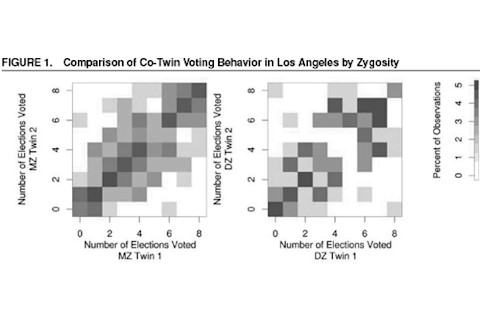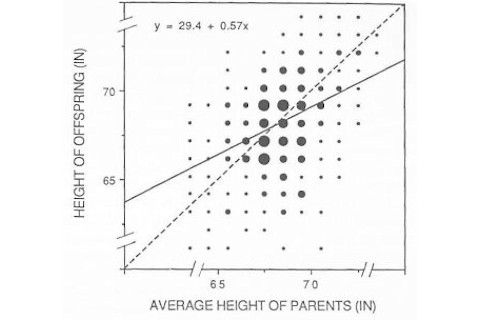I just read an interesting new paper, Genetic Variation in Political Participation:
The decision to vote has puzzled scholars for decades...The results show that a significant proportion of the variation in voting turnout can be accounted for by genes. We also replicate these results with data from the National Longitudinal Study of Adolescent Health and show that they extend to a broad class of acts of political participation. These are the first findings to suggest that humans exhibit genetic variation in their tendency to participate in political activities.
Here's a figure which really cuts to the chase:

Notice the greater dispersion of dizygotic (fraternal) twins? It is visually pretty clear that monozygotic (identical) twins are correlated to a greater degree. And of course the coefficient of relatedness of monozygotic twins is ~ 1.0 while that of dizogyotic twins is ~0.50. Here's an important section:
The results of the ACE model suggest that 53% of the variance in turnout behavior can be accounted for by additive genetic effects (
h^2
). The 95% credible interval (C.I.) for the estimate is (10%, 89%), indicating that we can reject the hypothesis that genes do not contribute to variation in turnout. The ACE model also suggests that the environment is important, with the shared environment (
c^2
) accounting for about 35% of the variance (C.I. 2%, 73%) and the unshared environment (
e^2
) accounting for 12% (C.I. 3%, 26%)....
Here's what the "ACE" model comes from: σ2P = σ^2A + σ^2C + σ^2E COVMZ = σ^2A + σ^2C COVDZ = 1/2σ^2A + σ^2C

If you've read my posts on quantitative genetics you know what all the symbols and scripts refer to. If you haven't, just focus on the "A," the additive genetic variance. What's additive genetic variance? It's the variance that accounts for narrow sense variability. It's the variation of genes within a population which accounts for variation of a trait when you exclude the dominance and epistatic components of variance. Get it? If not, just look at the chart to the left and the note the "line of best fit," the additive genetic variation just describes the slope of that line when you regress offspring trait value on those of their parents. If it is a line of slope 1 that indicates that heritability is perfect, and you can predict offspring trait value perfectly from that of the parent. If the slope is 0, that means there is no predictive value and the trait value of the offspring is due to components of variance such as environment. But, I do want to emphasize that heritability does not tell us how "genetic" a trait is, it is a way to describe how well we can predict offspring trait value from that of the parents in a situation where there is a variation within the population. In an environment of nutritional deprivation the heritability of height can be lower than 0.50, while in the modern world it is closer to 0.80 or 0.90. This does not mean that height is "more genetic" in the latter case than the former, it tells us that there is more environmental noise when you have much more variation across those inputs. When nutrition is controlled for by definition most of the remaining variation will be heritable; obviously genes aren't effected by better nutrition (to the first approximation, I know about epigenetics, etc.!). I've blogged about the heritability of political ideology before, and most of my comments apply here. Saying that about 1/2 of the variation in voter turnout might be due to additive genetic variation is the first step in generating for a proper & nuanced model of reality, not a number which settles any specific question. The fact that many other personality and behavioral traits exhibit heritabilities on the order of 0.50 should also allow us to gauge the plausibility of this particular finding. Here are the authors touching upon objections to twin studies:
MZ and DZ environments are comparable, arguing that the identical nature of MZ twins cause them to be more strongly affiliated and more influenced by one another than their non-identical DZ counterparts. If so, then greater concordance in MZ twins might merely reflect the fact that their shared environments cause them to become more similar than DZ twins. However, studies of twins raised together have been validated by studies of twins reared apart...suggesting that the shared environment does not exert enhanced influence on MZ twins. Moreover, personality and cognitive differences between MZ and DZ twins persist even among twins whose zygosity has been miscategorized by their parents...indicating that being mistakenly treated as an identical twin by one's parents is not sufficient to generate the difference in concordance. And, although MZ twins are sometimes in more frequent contact with each other than DZ twins, it appears that twin similarity (e.g., in attitudes and personality) may cause greater contact rather than vice versa...Finally, contrary to the expectation that the influence of the unshared environment would tend to decrease concordance over time once twins reach adulthood,MZ twins living apart tend to become more similar with age....
Ultimately my own interest in this topic is the transition from behavior genetics to behavior genomics. For example, see Heritability of the Ultimatum Game and DRD4, politics & friendship (same author). The main issue here is that it seems like that a large proportion of the above variance is due to QTLs of very small effect which are going to be hard to pick up. It isn't as if there are "genes for voter turnout," as it is it seems likely that that a host of genetically influenced upstream behavior propensities leads to whether you invest your marginal time in voting or not. So the genetic architecture of political variation might be elucidated more by focusing on its behavioral subcomponents.













